Gone are the days when dates held a monopoly on the fruit scene. If you’re looking for alternatives to dates or fruits with a similar taste to dates, you’re in luck! There are several date-like fruits out there that can satisfy your cravings. Let’s delve into the world of these delicious options.
Key Takeaways:
- There are several fruits resembling dates in taste, texture, and appearance.
- Prunes are a popular date substitute and can be used interchangeably in recipes.
- Dates are sweeter and smaller, whereas prunes have a subtle sweetness and a darker appearance.
- Figs are another fruit that is similar to dates but have their own taste and texture.
- Both dates and prunes offer nutritional benefits and can be enjoyed in various ways.
What Are Dates?
Dates are a delicious fruit that comes from the date palm tree, known scientifically as Phoenix dactylifera. They are enjoyed in both fresh and dried forms and have a unique taste that ranges from caramel-like to buttery. Dates are smaller in size compared to prunes and have a lighter color.
There are different types of dates, each with its own distinct taste and texture. The most popular varieties include Medjool, Deglet Noor, and Barhi dates. Medjool dates are known for their soft and chewy texture, while Deglet Noor dates have a slightly drier and firmer consistency. Barhi dates are often enjoyed when they are fully ripe and have a soft, creamy texture.
Dates are not only delicious but also offer a range of health benefits. They are high in calories, carbohydrates, and dietary fiber, making them a nutritious addition to your diet. The fiber in dates helps promote digestion and maintain a healthy digestive system. Dates also contain antioxidants that can help protect cells from damage and reduce inflammation.
In addition, dates have potential benefits for brain health. They are rich in natural sugars and provide a quick source of energy for the brain. Dates also contain important vitamins and minerals, such as potassium and magnesium, which are essential for brain function.
| Types of Dates | Taste | Texture |
|---|---|---|
| Medjool | Sweet and rich | Soft and chewy |
| Deglet Noor | Slightly sweet | Dry and firm |
| Barhi | Creamy and sweet | Soft and tender |
So whether you enjoy dates as a snack, use them in your baked goods, or add them to your breakfast bowl, you can savor their unique flavor while benefiting from their nutritional value. Incorporating dates into your diet can provide you with a sweet and healthy treat that offers numerous health benefits.
What Are Prunes?
Prunes are a type of dried fruit that is derived from specific varieties of plums, such as Japanese and European plums. They are known for their sweet and tangy flavor, as well as their distinctive wrinkled and dark appearance. Prunes have a chewy texture that adds to their unique eating experience.
When it comes to nutritional value, prunes are a powerhouse. They are rich in essential vitamins and minerals, including vitamin A, vitamin C, and vitamin K. Prunes are also packed with minerals like potassium and magnesium, which are important for maintaining overall health.
One of the notable differences between prunes and dates is their calorie and sugar content. Prunes are lower in calories and sugar compared to dates. On the other hand, prunes have a higher protein and fat content, making them a more balanced snack option.
Types of Prunes
There are different types of prunes available, each with its own unique characteristics. Here are some popular varieties:
| Type of Prune | Description |
|---|---|
| California Prunes | California prunes are known for their size and sweetness. They have a rich, fruity flavor. |
| French Prunes | French prunes, also known as d’Agen prunes, are smaller in size and have a deeper flavor profile. |
| Jumbo Prunes | Jumbo prunes are larger in size compared to other varieties. They are ideal for snacking and baking. |
Prunes can be enjoyed in various ways, including as a standalone snack, added to trail mixes, or incorporated into both sweet and savory recipes. They are often praised for their natural ability to relieve constipation due to their high fiber content.
Prunes are a versatile and flavorful dried fruit that offers a range of health benefits. From their nutritional value to their constipation-relieving properties, prunes are a valuable addition to a well-balanced diet.
Dates vs Figs vs Prunes
When it comes to dates, figs, and prunes, each fruit has its own unique characteristics that set it apart from the others. Let’s explore the differences and similarities between these delectable options:
Dates
Dates are known for their sweetness and rich flavor, ranging from caramel-like to honey-like. They have a lighter color, smaller size, and a soft texture. Dates are often enjoyed fresh or dried and are commonly used in baking, making them a versatile choice.
Figs
Unlike dates and prunes, figs have a dark brown and reddish color when dried. They have a chewy texture with small edible seeds and a delightful sweet and earthy flavor. While figs share a similar level of sweetness with prunes, they are generally less sweet than dates. Figs can be enjoyed fresh, dried, or used in culinary creations like pies and salads.
Prunes
Prunes, which are dried plums, have a wrinkled appearance and a dark color. They offer a unique combination of sweetness and subtle tartness. Despite their resemblances to dates, prunes have a milder sweetness. Prunes are often compared to brown sugar or molasses in terms of flavor. They are commonly used as a standalone snack or incorporated into savory dishes.
To summarize the differences, I have created a comparative table:
| Dates | Figs | Prunes | |
|---|---|---|---|
| Color | Light | Dark brown and reddish | Dark |
| Size | Smaller | ||
| Texture | Soft | Chewy | Wrinkled and chewy |
| Flavor | Sweet | Sweet and earthy | Sweet with subtle tartness |
| Common Uses | Snacking, baking | Pies, salads, snacking | Snacking, savory dishes |
As the table shows, dates, figs, and prunes each bring their own unique qualities to the table. While dates are sweeter and smaller, figs offer a distinct chewy texture and earthy flavor, while prunes have a subtle sweetness and wrinkled appearance. Whether you’re looking for a sweet snack or an ingredient for your culinary creations, you can choose the fruit that best suits your preference.
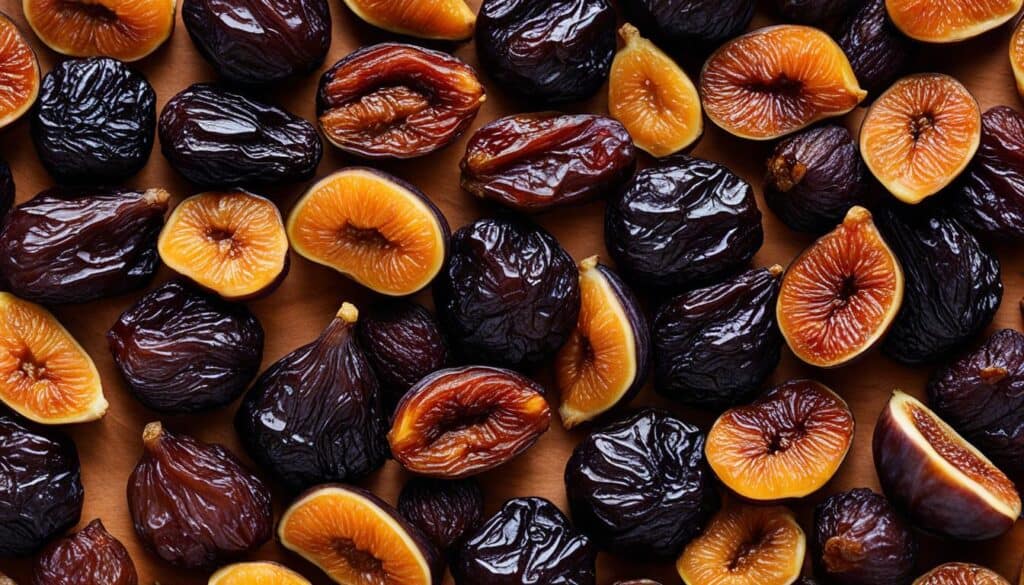
Health Benefits of Dates
Dates offer numerous health benefits due to their high nutrient content. They are rich in antioxidants, including flavonoids and phenolic acids, which help fight inflammation and protect against various diseases. Dates are also a good source of dietary fiber, which promotes digestion and helps maintain healthy bowel movements. They contain essential vitamins and minerals like potassium, magnesium, and vitamin B6, which support brain health and play a role in bone health. Dates can be included in a balanced diet for overall wellness.
Here are some of the key health benefits of dates:
- Antioxidant-rich: Dates are packed with antioxidants that help combat free radicals and reduce oxidative stress in the body. The antioxidants found in dates, such as flavonoids and phenolic acids, have been linked to a lower risk of chronic diseases, including heart disease and certain cancers.
- Digestive health: The high fiber content of dates promotes healthy digestion and prevents constipation. Fiber adds bulk to the stool, eases bowel movements, and supports a healthy gut microbiome. Regular consumption of dates can help maintain a healthy digestive system.
- Brain health: Dates contain essential nutrients like potassium, magnesium, and vitamin B6, which are beneficial for brain health. These nutrients support cognitive function, improve memory, and enhance overall brain health. Including dates in your diet may have positive effects on brain performance.
- Bone health: Dates are a good source of minerals like calcium, magnesium, and phosphorus, which are essential for maintaining bone health. Regular consumption of dates can help strengthen bones, prevent osteoporosis, and reduce the risk of fractures.
“Dates are a versatile and delicious fruit that offer a range of health benefits. They are packed with antioxidants, fiber, and essential nutrients that support overall well-being. Including dates in your diet can promote digestive health, boost brain function, and strengthen your bones.”
Overall, dates are a nutritious and tasty addition to a balanced diet. Whether enjoyed on their own as a snack or used in various recipes, dates can contribute to your overall health and well-being.
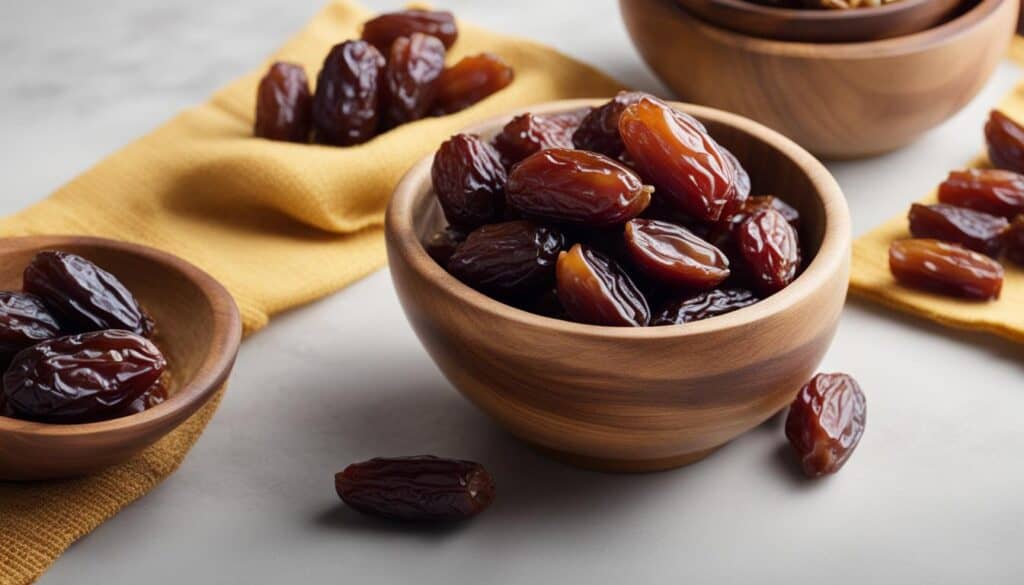
Health Benefits of Prunes
Prunes are not only delicious but also packed with a variety of health benefits. Incorporating prunes into your diet can contribute to your overall well-being in multiple ways.
First and foremost, prunes are a great source of fiber, specifically insoluble fiber. This type of fiber promotes regular bowel movements and helps relieve constipation, making prunes a natural solution for digestive issues.
“Prunes are an excellent natural remedy for constipation. The high fiber content helps regulate digestion and prevent constipation, providing relief and promoting digestive health.”
In addition to their fiber content, prunes contain antioxidants that help protect the body against free radicals, which can cause cellular damage. These antioxidants, along with the vitamins and minerals present in prunes, support heart health and reduce the risk of cardiovascular diseases.
Prunes are rich in vitamin A, vitamin C, and potassium, all of which contribute to maintaining a healthy heart. Vitamin A supports the health of cardiac muscles, while vitamin C plays a role in reducing inflammation and strengthening blood vessels. Potassium helps regulate blood pressure, promoting cardiovascular well-being.
Furthermore, the fiber and nutrients in prunes also contribute to bone health. Prunes are a good source of both vitamin K and potassium, which are essential for maintaining strong and healthy bones. Vitamin K helps improve calcium absorption, while potassium reduces bone loss and maintains bone density.
Lastly, prunes have a low glycemic index, making them suitable for blood sugar control. The natural sugars in prunes are released slowly into the bloodstream, preventing sharp spikes in blood sugar levels. This makes prunes a smart choice for individuals who need to manage their blood sugar levels.
Overall, prunes are a nutrient-dense fruit that offers a wide range of health benefits. Adding prunes to your diet can help with constipation, support heart health, improve bone health, and aid in blood sugar control.
| Nutrient | Amount per 100g |
|---|---|
| Calories | 240 |
| Protein | 2g |
| Total Fat | 0.4g |
| Dietary Fiber | 7g |
| Vitamin A | 1444 IU |
| Vitamin C | 0.9mg |
| Potassium | 732mg |
As shown in the table, prunes provide a significant amount of calories and fiber, making them a satisfying and nutritious snack. They are also rich in vitamin A, vitamin C, and potassium, which support various aspects of your health.
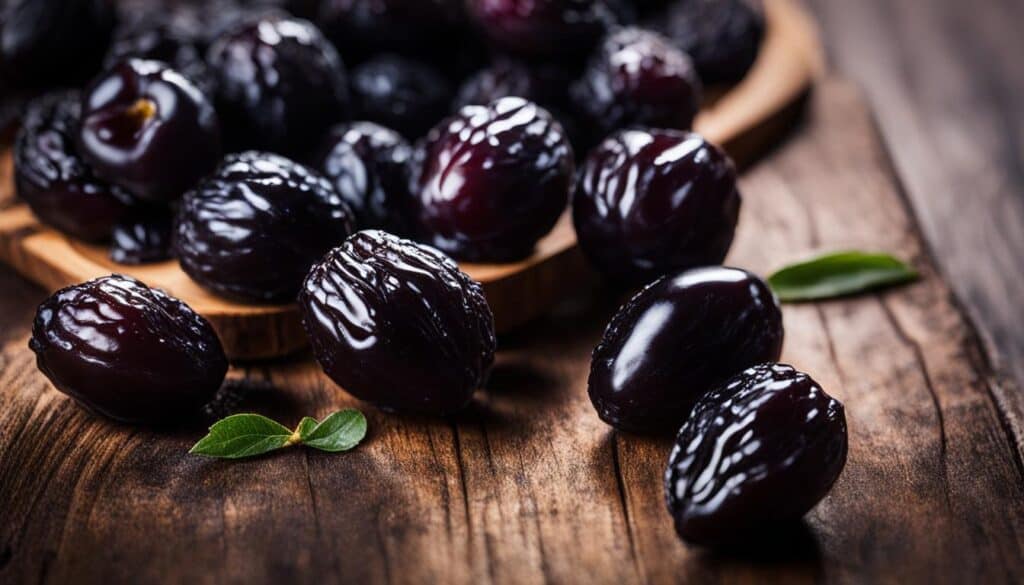
Taste Differences Between Dates and Prunes
When it comes to taste, dates and prunes offer distinct flavor profiles that make them suitable for different culinary uses. Dates are known for their pronounced sweetness, ranging from caramel-like to honey-like. They have a rich and indulgent flavor that beautifully complements various dishes. On the other hand, prunes have a milder sweetness with a slight tartness. Their flavor is often compared to brown sugar or molasses, adding a unique depth to recipes.
The differences in taste between dates and prunes allow for creative exploration in the kitchen. Dates are popular for snacking and baking, adding a natural sweetness to energy balls, cakes, and desserts. Their flavor pairs well with ingredients like nuts, chocolate, and spices. Prunes, on the other hand, are often enjoyed as a standalone snack or used in savory dishes, such as stews, tagines, and stuffing. They provide a pleasant balance of sweetness and tanginess that enhances the overall taste.
Both dates and prunes bring their own distinct qualities to dishes, offering a delightful burst of flavor. Whether you’re looking for a luxurious sweetness or a subtle tartness, these fruit alternatives are sure to satisfy your taste buds.
| Date | Prune |
|---|---|
| Pronounced sweetness | Milder sweetness with a slight tartness |
| Rich and indulgent flavor | Flavor compared to brown sugar or molasses |
| Used for snacking and baking | Enjoyed as a standalone snack or used in savory dishes |
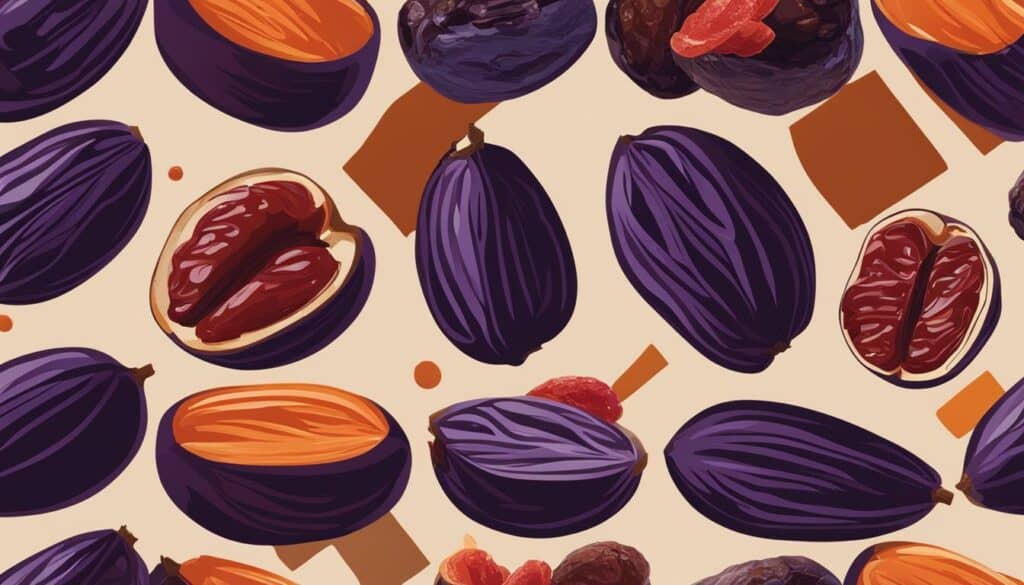
Health Comparison of Dates and Prunes
Dates and prunes offer similar health benefits and have comparable nutritional profiles. While they differ in certain aspects, both fruits can contribute to a healthy diet. Let’s explore the health comparison between dates and prunes.
Nutritional Value
Dates are higher in calories and carbohydrates compared to prunes, making them an excellent source of energy and satiety. They are also rich in dietary fiber, potassium, and magnesium, which support overall health and aid in digestion.
Prunes, on the other hand, are lower in calories and higher in protein and fat. They are also packed with fiber, potassium, and magnesium, providing similar health benefits to dates.
Antioxidant Content
Dates are particularly high in antioxidants, including flavonoids and phenolic acids. These compounds help fight inflammation, protect against various diseases, and promote overall well-being.
Prunes also contain antioxidants, although in slightly different quantities than dates. Their antioxidants contribute to heart health and may help reduce the risk of certain diseases.
Bone Health and Digestion
Dates can play a role in promoting bone health due to their rich calcium content. They also contain vitamins and minerals that support bone strength and density.
Prunes, on the other hand, have been associated with improved bone health due to their high content of vitamin K and potassium. Additionally, prunes have a natural laxative effect, aiding digestion and relieving constipation.
By consuming dates and prunes as part of a balanced diet, you can enjoy their health benefits and incorporate variety into your fruit choices.
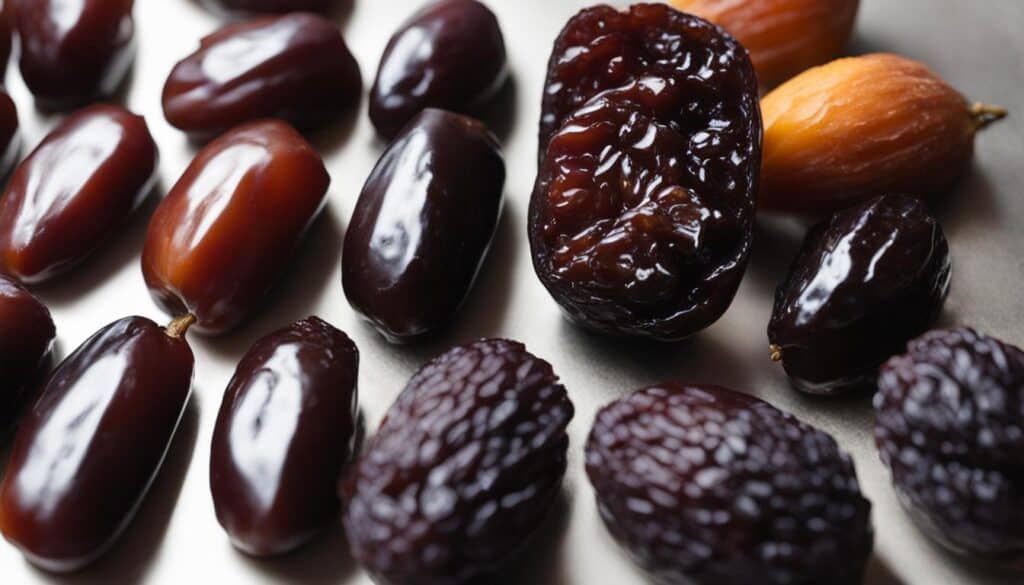
Conclusion
In conclusion, dates and prunes are both delicious and nutritious fruit options that can serve as tasty alternatives to each other. While dates are sweeter, smaller, and lighter in color, prunes have a subtle sweetness, a wrinkled appearance, and a darker color. Both fruits offer unique characteristics that can enhance various culinary experiences.
Dates, with their rich sweetness and caramel-like flavor, are often preferred for baking, as they add natural sweetness and depth to desserts and baked goods. On the other hand, prunes, with their milder sweetness and tangy undertones, are recommended as a standalone snack or as an ingredient in savory dishes, such as stews and sauces.
When it comes to nutritional value, dates are higher in fiber and antioxidants, making them beneficial for digestive health and potentially offering anti-inflammatory properties. Prunes, on the other hand, are higher in protein and fat, which can contribute to a feeling of satiety and provide essential nutrients for overall well-being.
Ultimately, both dates and prunes can be enjoyed for their delicious taste and health benefits. Whether you’re baking a sweet treat or looking for a nutritious snack, these date-like alternatives have you covered. So go ahead, add some natural sweetness to your life with dates or enjoy the unique flavor of prunes. The choice is yours!
FAQ
What are some fruits similar to dates?
There are several fruits that have a similar taste to dates, including prunes, figs, and raisins. These fruits offer a sweet and rich flavor that can be used as alternatives in various recipes.
What are the differences between dates and prunes?
Dates and prunes have distinct differences in taste, appearance, texture, and nutritional value. Dates are sweeter and smaller, with a lighter color, while prunes have a subtle sweetness and a wrinkled, dark appearance.
Can prunes be used as a substitute for dates in recipes?
Yes, prunes can be used as a substitute for dates in recipes. However, it’s important to note that prunes have a slightly different taste and texture compared to dates, which may affect the final outcome of the recipe.
What are the health benefits of dates?
Dates are high in calories, carbohydrates, and dietary fiber, making them a nutritious addition to the diet. They also contain antioxidants and have potential health benefits, such as promoting brain health and aiding digestion.
What are the health benefits of prunes?
Prunes offer a range of health benefits, including promoting regular bowel movements, supporting heart health, and contributing to bone health. They are also rich in nutrients like vitamins A, C, and K, as well as minerals like potassium and magnesium.
How do figs compare to dates and prunes?
Figs have a different appearance, texture, and taste compared to both dates and prunes. They have a dark brown and reddish color when dried, a chewy texture, and a sweet and earthy flavor. Figs can be enjoyed fresh or dried and are often used in baking.
Are dates and prunes similar in terms of nutritional value?
Dates and prunes have similar nutritional profiles and offer several health benefits. Dates are higher in calories and carbohydrates, while prunes are lower in calories and higher in protein and fat. Both fruits are rich in fiber, potassium, and magnesium, which support overall health and digestion.
How do dates and prunes differ in taste?
Dates have a pronounced sweetness, ranging from caramel-like to honey-like, while prunes have a milder sweetness with a slight tartness. The differences in taste make them suitable for different culinary uses, with dates being popular for snacking and baking, and prunes often enjoyed as a standalone snack or used in savory dishes.

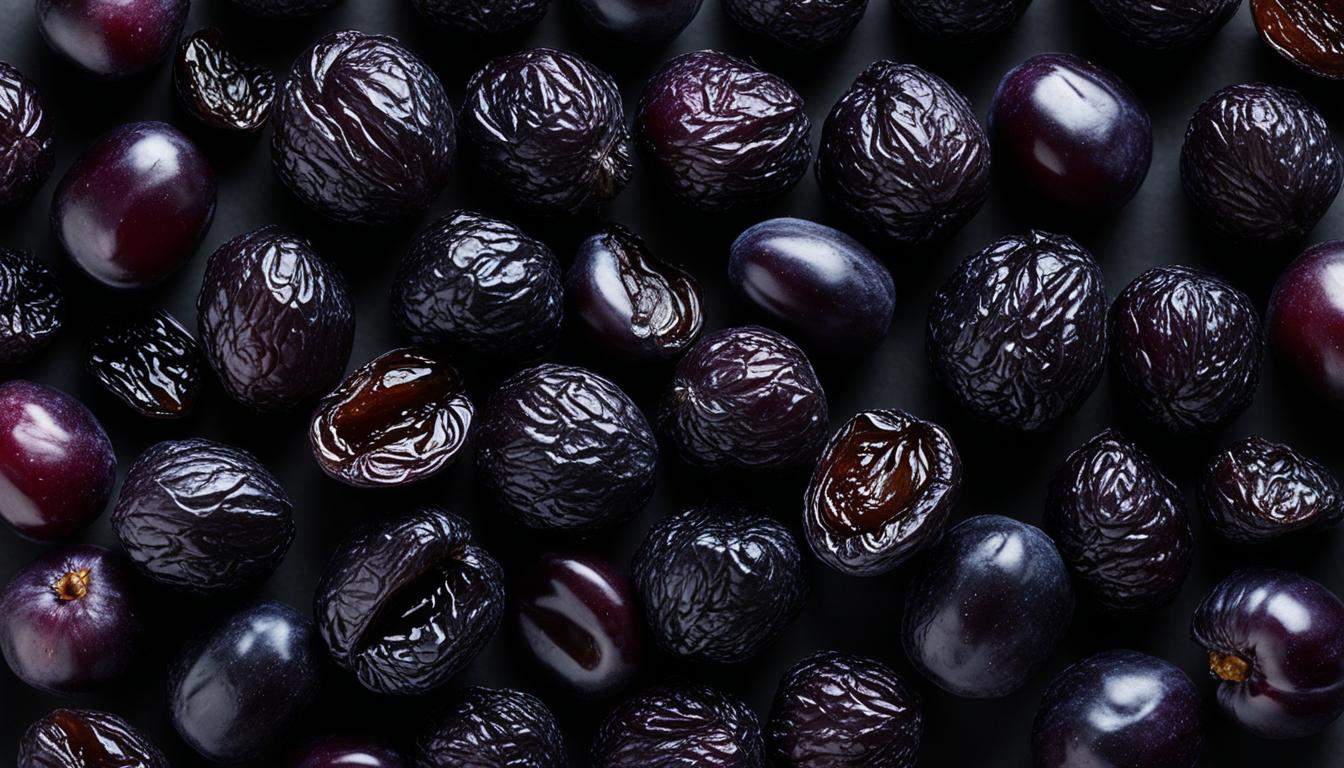



Leave a Reply